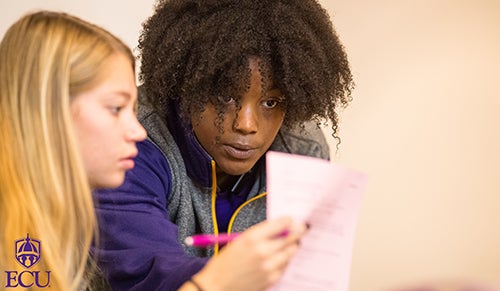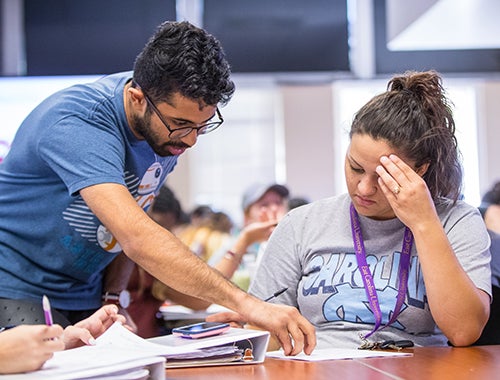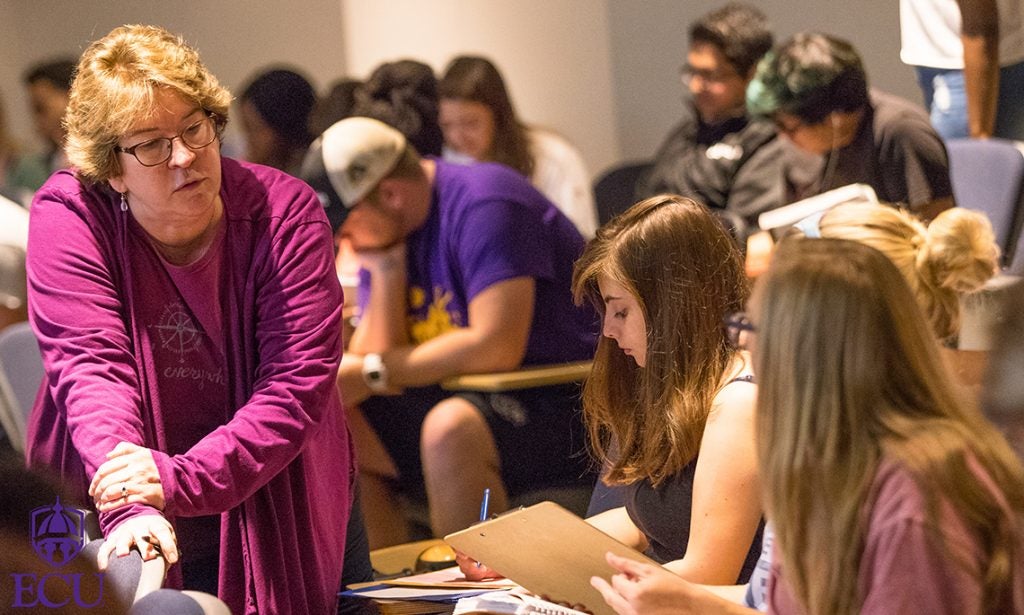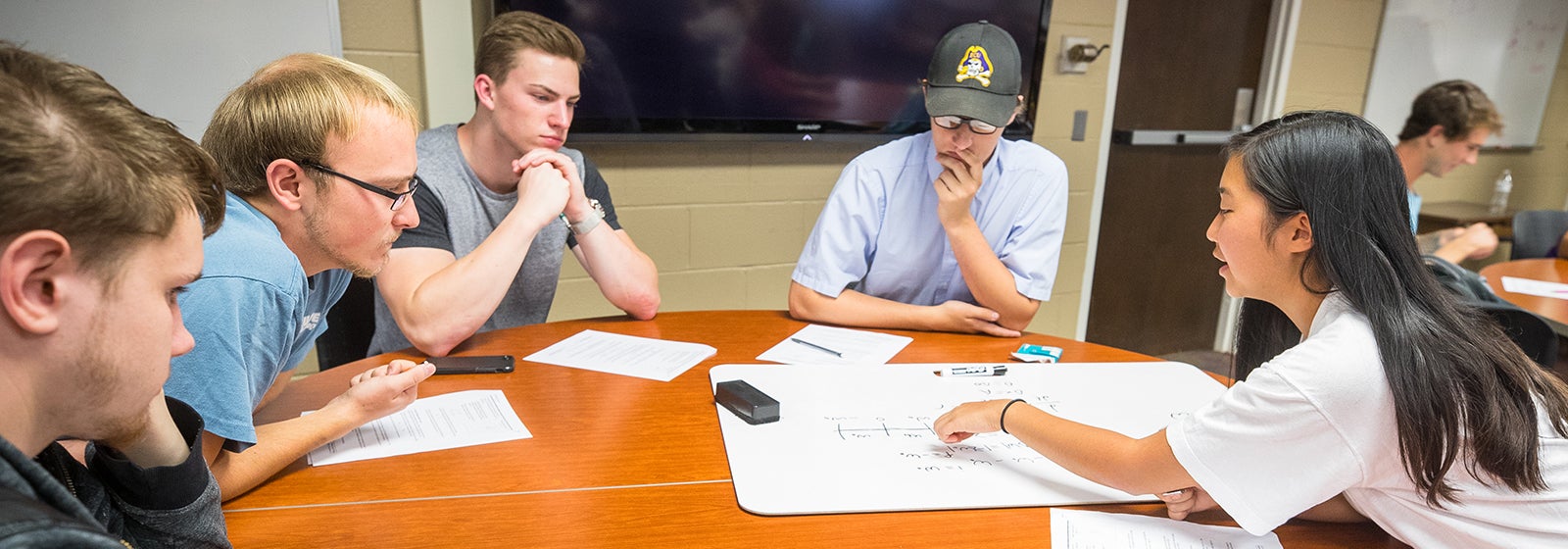STUDENTS HELPING STUDENTS
ECU’s Learning Assistant Program increasing STEM teachers
Twenty-eight ECU students in the Learning Assistant Program are helping their fellow students better understand course material in biology, chemistry and physics by engaging classes in interactive-learning practices and inquiry-based activities. The results may include an increase in students pursuing teaching as a career, and decreased D and F course grades or withdrawal rates (DFW) in STEM courses.
Bailey McClendon, a student in one of the chemistry classes, said, “I feel that the LAs help us understand the material better.”
“They don’t just give us the answers,” said fellow student Nainika Nandigama. “They explain it and help us get the answers ourselves.”
Alicia McCoy said the LAs are good at helping them go through the problems and that they “give us more one-on-one contact.”
ECU’s LA Program is a pilot program developed in 2015 by faculty in the STEM Collaborative for Research in Education (CoRE) – Dr. Kristine Callis-Duehl, assistant professor of biology; Dr. Daniel Dickerson, associate professor of science education in the department of mathematics, science and instructional technology education; Dr. Joi Walker, assistant professor of chemistry education; and Dr. Steven Wolf, assistant professor of physics. It is built upon a model introduced more than 20 years ago at the University of Colorado-Boulder and is used internationally at more than 100 member institutions.
This fall, ECU’s STEM CoRE received funding from ECU Provost Dr. Ron Mitchelson to continue the work of the pilot program for the next two years. Currently, the program consists of two classes in each discipline, with plans to expand the program after the two-year pilot.
LAs attend a pedagogy course offered through the College of Education, where they are taught learning styles and questioning methods. This gives LAs the ability to think about ways they are going to answer other student’s questions in the classes they serve and how to get students to openly share their ideas.
Next, LAs meet with the professors of their assigned courses, working through information that will be presented in the classroom. Finally, they attend the classes and work directly with the students. Students learn about the foundational concepts outside of the classroom, and the LAs engage the students in group activities, exploring concepts in a deeper way.

Donchelle Brown (right) assists a student in Walker’s chemistry class.
“An LA’s biggest job is to bring out the students’ ideas, so that they can say, ‘I think this is what is going on,’” said Wolf.
Wolf said students are able to try out wild theories and concepts in a safe space, and that through this process, they learn how the science works.
“I really enjoy getting back into the mindset of what it was like to learn these things,” said Cassie Meyer, senior sociology major and LA for Walker’s chemistry class. “The comradery is really important, and it makes students feel more comfortable talking to a peer.”
Donchelle Brown, a sophomore athletic training major who also assists in Walker’s chemistry class, said, “The best thing is being able to help people understand the problems. I think I really impact them a lot. They are open to asking me questions, and I try to help as much as possible.”
Part of the focus of the LA Program is to demonstrate that teaching is valuable. It gives the LAs experience in a teaching role and may lead them into a masters of teaching program or into a duel degree with a teaching certificate.
In a few years, this may lead to an increase in the number of STEM teachers in elementary, middle and high schools.
Tyler Carr, a LA for Wolf’s physics class who aspires to become a professor of physics, said, “I think one of the coolest parts about it [being an LA] is that you learn the material better by teaching it to someone else.”
Kate Higgins is a public health senior and LA in Callis-Duehl’s biology class. She wasn’t interested in becoming a teacher before this experience, but now she is considering teaching.

Shlok Joshi, neuroscience and psychology junior, guides a student through a problem in one of the learning assistant-led biology classes.
“It’s really rewarding to actually see lightbulb moments, because in a regular lecture classroom kids will just sit there,” said Higgins. “With this style of classroom, we take what is being said and rearrange it a little to a level that students can actually understand, and you can see it on their face – that lightbulb moment. It’s pretty cool.”
Another key point of the program is a reduction in the DFW rates in STEM classes due to a better understanding of material taught through the active-learning model.
“I enjoy that we get to help the students,” said Wasseem Chaya, a biochemistry senior and LA in Callis-Duehl’s biology class. “I know that a lot of the time they are struggling. So it really makes them feel like ‘someone is there,’ ‘someone wants me to do well.’ It gives them the little push they need.”
Shlok Joshi, a junior majoring in neuroscience and psychology and also assisting in Callis-Duehl’s course, said, “The first time I learned the material, I knew what I tripped up on. So it helps to know what they may trip up on.”
Walker said she noticed after administering her first chemistry test that there was a half-letter grade increase in average test scores. In another chemistry class being taught through the program, she said those students had a full letter grade average increase.
“I’m very excited for the potential on both increasing science teachers and helping students be more successful in the foundational courses,” said Walker.
Additional information about ECU’s STEM CoRE is available at http://www.ecu.edu/cs-acad/aa/StemCore/faculty.cfm.

Dr. Joi Walker proves that learning assistant classes also can be led in traditional, theater-style classrooms.
